 |
| Emperor of Denial. |
"You're making it way too easy for them; you're walking right INTO it!"
Or perhaps that should be walked. Past tense. We cakewalked right into it.
That's the quote that went through my head as I read George Orwell's, "Homage to Catalonia", the tribute written to the tragedy of the Spaniards and the love of this tortured country felt by the author after spending time there during the Spanish Civil War as a member of the POUM, one of the many revolutionary groups fighting Franco during the thirties. The complexity of the alliances and counter-alliances, the betrayal and misrepresentation by the press, and the left in other countries, as well as by the leaders of those other countries, banded together in the League of Nations, was partially documented at the time by Upton Sinclair in his "World's End" series, which he started while the conflict was still raging, in 1937 (Orwell's account wasn't published until after the war, in 1952).
Around the turn of the century, I went back to college to finally get my degree, and one of the courses I needed to take was a History course. In one of the first papers due, I likened the point of history we were studying to the present day and was immediately chastened by Le Professeur for so doing. I disagreed with him, but, considering that I wanted to, not only finish my degree, but ace the course, I demurred, and found that I became reconciled to his way and eventually came to understand its merits.
However, I'm no longer in college, alors, there's nothing to stop me from doing that now, so I confess that I do it all the time, and while reading this book, I did it consciously and deliberately, because, ever since reading Sinclair's take on the Spanish Civil War, I had become convinced of the parallels that were undeniable between the dynamics of the Spanish Civil War and those of the Civil War that the US started in Iraq. Lionel Trilling, who wrote the introductory essay to Orwell's novel, fueled my flame, and much of what follows is inspired by that essay, even though he was referring to Communism, whereas I'm using much of his same rhetoric while addressing some of the Ironies of Democracy:
In a Democracy, where politics are presumed to be available to everyone, ideas and ideals play a great part, but there is a direct connection between their power and another kind of power, one we were reminded of by how easily the Bush family was able to get us to silently acquiesce to our ill-fated "cakewalk" into Iraq, namely that old, unabashed, cynical power of Force. Capitalism, the wolf that so scurrilously wraps itself in Democracy and Freedom's clothing, always surprises us with this. Americans are so besotted with their love of War they don't realize it's a racket, and one for which they pay dearly, and because of which they have been impoverished. Their cities neglected, their infrastructure left to crumble, their offspring rendered unemployable, all as the Aristocracy rake in the profits from this racket, ensconced in their unassailable gated communities, and the reason that all the financial shenanigans indulged in during the Bush reign were not only allowed, but encouraged: to pay for The Wars which were waged with no thought of how we were to pay for it when a sizable tax cut had been extended to the only group of citizens with the wherewithal to do so. But they knew. They knew not jonly that, but exactly how, they would extort their pound of flesh.
We are always being surprised by this. Democracy's use of unregenerate force and systemic fraud was perfectly clear long before Bush fils, but many of us found it impossible to admit this because Democracy speaks boldly, even fondly, to our love of ideas and ideals. We try hard as we can to believe that politics might be an idyl, refusing to discover that what we take to be a political pastoral is really a grim military campaign - or that what we insist on calling American Exceptionalism is in actuality a not-so-new Imperialism. By pretending that the dark meaning of Full Spectrum Domination is a mystery, many good people engage in an ultimate immorality. That the right wing that propagates this militaristic hubris is quite aware of this is evidenced by the clamor by the Moral Majority for strict adherence to sexual mores so that any criticism of the debased immorality of their militarism is drowned out in the clamor.
Whether in Egypt, Afghanistan, Syria, or Iraq, , Iran or Pakistan, we are witnessing not the much bally-hooed Arab Spring, but a deep disillusionment, not only with the Communism so triumphantly relegated to the dustbin of history, but to Democracy so delusionally heralded as their Savior, as it leaves the liberal modernists of each of those countries drowning in a US-inspired-and-funded rise of Religious fundamentalism, whose adherents, lacking any of the amenities Capitalism promised them, and seeing from the spectacle of Greece, for example, that it will never deliver them, prefer to cling to their traditional values. The majority, which in Democracy, rules, prefer to adhere to a mode of existence that has served them well, (unless perhaps, they're female, yet, even then, - inexplicably to many Western liberals - like the orthodox Babushkas of Russia, it is exactly the women who cling to religion the most tenaciously).
Given their atavistic retrograde nature, it is truly doubtful, even to us, that the commitment to Democracy heralded by the avatars of freedom, as they dropped depleted uranium onto the civilians of Iraq, was made for generous or idealistic reasons, however what is certain is that the revulsion those countries feel for it now was brought about by the very militarism we are insisting on using now, not only against ISIS in Iraq, Syria, Libya, Somalia, and Yemen, but against more modern nations like Iran and Ukraine, and, suicidally, Russia (the return to MADness was all but assured as Congress started to more and more resemble an insane asylum). This painful experience with Democracy and Capitalism is exactly what made me reflect on the situation in Europe, before, and even after, the World War, where, unlike in the US, Capitalism was a bogeyman, the purported cause of the destruction that rained down on them, brought about by their own leaders' lust for power and insatiable greed.
For, as in Spain in the 1930's, the Arab nations are less interested in whether Capitalism or Socialism or any -ism is what they want, as they are in simple survival mode, such that if, indeed, politics are to be available to everyone, then everyone must protect his politics from the ravages of ideology, and instead, cultivate a society which reflects the bitter metaphysics of human nature, and not only its basest of drives, greed, that American Capitalism has so proudly prostituted Democracy into strutting around as a virtue.
Just as Communism, by 1936, was losing it hold on the imagination of intellectuals as word of Stalin's purges were seeping into their hushed conversation about what was going on in Russia, the same doubts and concomitant rejections are transpiring in the Middle East as they become cognizant of the fact that, as deadly and destructive as the Americans have proved as friends, they are even more deadly to themselves, as the number of its own citizens murdered by their police forces has exceeded even the number of its multifarious enemies abroad mowed down by its multifaceted military. Remaining sublimely unaware of the new Russian actuality, NATO pooh-poohs the threat of ISIS and has written off as anachronisms the very forces they themselves are using to shape the world - racial pride, leader-worship, religious belief, patriotism and love of War. In their deadly embrace of Capitalism, they cannot conceive of directing upon themselves the same stringency of criticism they use on Russia, even as the enormity of its failure, and mounting evidence of the intransigence of Western Imperialism's problems, overwhelm their ability to staunch its hemorrhaging wounds.
Yet here I sit, using the very tools that the Imperium has built for its domination of the globe, striking the same pose as the left-wing intelligentsia of that bygone era, with its "generally querulous negative attitude and complete lack of constructive suggestion" making me feel like I simply engage in the "irresponsible carping of people who have never been and never expect to be in a position of power". Although such criticism stings, I consider my blog, first of all, as the word implies, as a journal, such that its never published to, nor therefore will ever be read by, the masses. It is more a compendium of our era's mistakes that resulted from taking political advantage of using stupidity for a cloak to hide, as Walter Bagehot suggests, ones own private material interests, while pretending it is to merely disengage from the intellectual theorizing of the political motives driving public policy, disingenuously claimed to be beyond one's ken. So, becasue the profession of journalism has completely failed us, I find it incumbent upon myself to ferret out the truth from the lies, distortion, and outright propaganda that we are fed, and see if I can't discern a signal amidst the static and the deliberately inserted noise.
Which brings us back to the several points that I wish to make regarding our current situation's and its multiplicity of warring parties in what has come to be considered the world's oilpatch, but what is in fact the resources of a region that, thanks again to our own machinations, will soon have as much need of the very energy assets for which we became interested in the region in the first place. Because as talk of peak oil has peaked, so has the conversation on the growing energy needs of all the nations that export it, meaning that the same dynamic, albeit indirectly, is in play that drives fracking and tar sands production: increased energy burned for every drop squeezed out of the ground. The only difference is that in the oil-producing nations of the Middle East, those inputs aren't needed in direct production of oil, but in its utilization by their societies as they modernize. But the result is the same, for every drop produced, the amount of energy available to the world market decreases; in the one case because more of it has to be taken back to invest in the next barrel to be produced, while in the latter case, it's burned by the growing energy demands of the producers' themselves.
This is only one of several points that escapes general notice. Which was the case at the time of the Spanish Civil War. As Orwell states (parentheticals are mine):
"To begin with, Franco was not strictly comparable with Hitler or Mussolini. his rising was a military mutiny backed up by the Aristocracy and the Church, and, in the main, was not so much an attempt to impose Fascism as to restore feudalism (the same dynamic in play today: all assets are being systematically funneled into the hands of the Supra Class, the newly-minted peasants are meanwhile weighed down in intractable debt). This meant that Franco had against him not only the working class but various sections of the liberal bourgeoisie - the very people who were supporters of Fascism when it appears in its modern form - (which in turn is merely a secularization of the Monarchy without the Church's granting the Divine right, but the voting public conferring it instead: from leaders of the Masses to leaders from the masses). More importantly, the Spanish working class did not, (as would be the case with modern OECD countries, or even those of the Muddled East), resist Franco in the name of 'democracy' and the status quo; their resistance was made with a definite revolutionary object in mind. Land was seized by the peasants; many factories and most of the transport were seized by the trade unions; churches were wrecked and the priests driven out or killed. That's why the Catholic clergy was able to represent Franco as a patriot delivering his country from hordes of fiendish 'Reds'."
That's how the League of Nations was able to declare its neutrality and disallow any arms sales to the legitimate government, which left, by default, Franco as the only one with a modern army, as both Hitler and Mussolini poured arms and men into Spain; Hitler using it to test the efficacy of his Wehrmacht before unleashing it on the rest of a Europe that had sat back and let him eviscerate Spain, using Salazar's 'neutral' Portugal as its port of entry and passive war profiteer. Because, although believed in by the peasants and working class whose privations had become unendurable, The Spanish Civil War was, the same as any other, a racket. A loud racket that helped to drown out the reality of a progressive degradation of such things as personal liberty and a truthful press. Thus, one could begin to discern what was likely to happen, and the prospect was not rosy. This is about where we can swap word-for-word what Orwell says about Spain for Iraq:
"As for the newspaper talk about being a 'war for democracy', it was plain eye-wash. No one in his right sense supposed that there was any hope of democracy (especially no one in the Bush administration ... never did), in a country so divided and exhausted as Spain would be when the war was over. It would have to be a dictatorship, and it was clear that the chance of a working-class dictatorship had passed. That meant that the general move would be in the direction of some kind of Fascism. Fascism called, no doubt, by some politer name and - because this was Spain - more human and less efficient than the German variety. Or, which was always a possibility (it still is) that the war would end with Spain divided up, whether by casual frontiers or into economic zones. Whichever way you took it it was a depressing outlook. Whatever faults the Government might have, Franco's regime would certainly be worse."
The last sentence alone needs to be altered to, "Whatever faults Saddam's government had, the American regime would certainly be worse". As it has proven to be. When you have had a glimpse of such an unequivocal disaster as this - and however it ends the Iraq War and the offshoots that it has spawned throughout the Middle East, such that Civil War is raging or nascent in every country in the region, will turn out to be an appalling disaster, quite apart from the slaughter and physical suffering - the result is more often disillusionment and cynicism.
But the Iraq War was a War of cynicism from the outset. The most it ever hoped for was a Mubarak, or a Shah, or a Poroshenko: a 'democratically elected' conduit to enable the resources and fruits of the labor of the Iraqi people to be siphoned off, in the same way its oil fields were siphoned off - using Halliburton horizontal drilling technology - to Kuwait, into the Empire's coffers. Whatever is likely to happen next, the prospects for the land we cakewalked into, whilst claiming the profits from its increased oil production, post-cataclysm, would pay for the rampage, are anything but rosy.









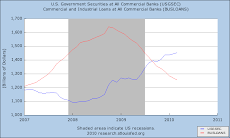


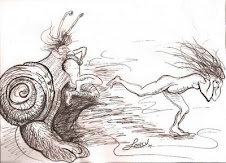



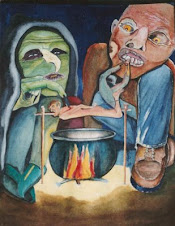


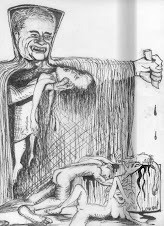


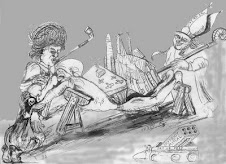



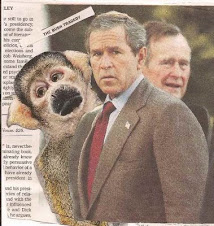
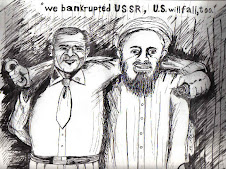

No comments:
Post a Comment